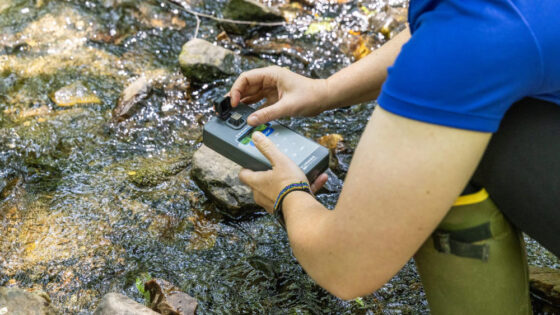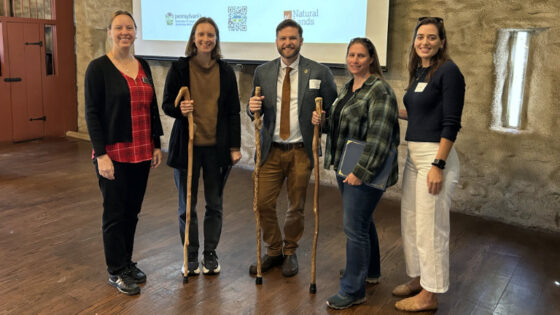Contact us to SCHEDULE A PROGRAM and inquire about our FREE PROGRAMS for public schools! Email educationprograms@stroudcenter.org.
By Tara Muenz

The Education Department at Stroud Water Research Center was a busy place this fall! Staff members trained “watershed ambassadors” in New Jersey, kicked off a citizen monitoring program in Costa Rica, presented curriculum tools in North Carolina, and hosted a Leaf Pack Workshop and Stream School programs for adults as well as middle and high school classes right here at home.
Branchville, New Jersey
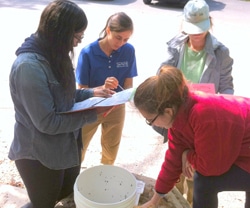
On a beautiful early autumn day in September, Education Program Manager Tara Muenz, along with the staff from the New Jersey Department of Environmental Protection (NJDEP), instructed 20 “watershed ambassadors” in stream macroinvertebrate monitoring and identification at the New Jersey School of Conservation in the Stokes State Forest.
Every year the state of New Jersey establishes a group of watershed ambassadors for each of their 20 sub-watersheds. These ambassadors lead outreach and education activities within their watershed while using their training to collect important baseline water quality data for NJDEP.
Muenz returned to New Jersey in late October to assist NJDEP staff in a second workshop for more than 20 citizen monitors from the Raritan River area.
Osa Peninsula, Costa Rica
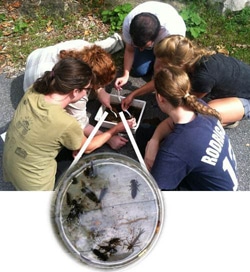
Early in October, two of Stroud’s staff embarked on a journey to the Osa Peninsula of Costa Rica to begin training local citizens to understand and protect their local waterways.
After several months of planning and discussions with the staff of Osa Conservation, Allegheny College professor Dr. Mike Palmer, Blue Moon Foundation staff, Stroud scientist Willy Eldridge, Ph.D., and Education Program Manager Tara Muenz finalized materials needed to launch a citizen monitoring program.
The team spent two days training Osa Conservation’s staff and then together launched a citizen training workshop at Osa Conservation’s field station.
View photos from the Costa Rica trip
The goal of the program is to empower citizens to have a greater connection to their landscapes and waterways and to help identify sites and activities that may need better management to protect water quality.
Training materials and a water atlas for displaying monitoring data will be available on the new Spanish language website at RiosSaludablesDeOsa.org.
Asheville, North Carolina
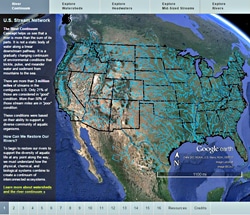
In early September, Director of Education Susan Gill, Ph.D., traveled to the 2014 Water Education Summit in Asheville to present the Model My Watershed project as part of a seminar titled “Understanding Watershed Connectivity” that was co-led with Lucy Laffitte from UNCTV NC Science Now.
Navigate a Watershed, an online educational curriculum, was also presented to more than 200 education professionals at the conference. Gill, Stroud Assistant Director David Arscott, Ph.D., and Stroud Web Developer Heather Brooks assisted Laffitte in producing the curriculum.
Stroud Water Research Center, Avondale, Pennsylvania
In all, more than 550 students and citizens, from Boy Scouts and Brownies to local schools to students and teachers from Cabrini College, visited Stroud Water Research Center this fall to participate in our Stream School programs.
Thank you to the schools and nature centers that experienced our Stream Programs this fall!
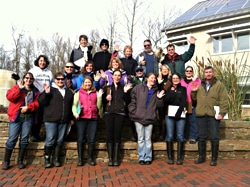
Tatnall School ~ Tyler Arboretum Camp ~ Cabrini College ~ West Chester University ~ Friends School Haverford ~ The Montgomery School ~ Kennett High School ~ Charles F. Patton Middle School
On a cold but beautiful Saturday in November, 20 teachers and naturalists from across the country participated in a workshop led by Muenz and sponsored by 3M and Tyler Arboretum. The workshop explored area streams for leaves and stream macroinvertebrates utilizing The Leaf Pack Network® protocols.
View photos from the Leaf Pack workshop
The Leaf Pack Network® offers a unique and fun way to engage students and citizens in the aquatic world while collecting important water quality information. Visit the Leaf Pack Network website to find out more about the program and to be notified about upcoming workshops.

